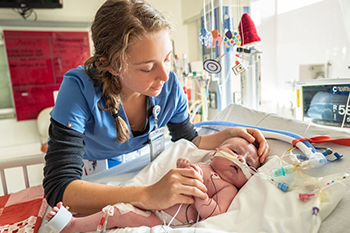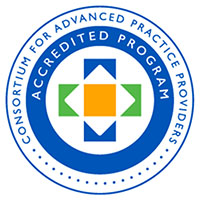Neonatal Physician Assistant Fellowship
 Welcome to the Seattle Children’s Neonatal Physican Assistant Fellowship! Our mission is to provide board certified physician assistants the post-master’s degree education, training, and skills they need to become successful and confident neonatal advanced practice providers. Our Neonatal PA Fellowship is a 12-month clinical and didactic training program with a cohort starting once per year.
Welcome to the Seattle Children’s Neonatal Physican Assistant Fellowship! Our mission is to provide board certified physician assistants the post-master’s degree education, training, and skills they need to become successful and confident neonatal advanced practice providers. Our Neonatal PA Fellowship is a 12-month clinical and didactic training program with a cohort starting once per year.
-
Prerequisites
Prior to matriculation into the Neonatal PA Fellowship Program, the PA applicant must meet the following requirements:
- Graduated from an ARC-PA–recognized physician assistant school
- Master’s degree
- NCCPA board-certified
-
Facilities
Neonatal PA Fellows will spend most of their time rotating through three of the level III community sites in the SCH regional neonatology program. This will help establish a solid foundation to become a competent neonatal advanced practice provider. At the end of the year, Fellows will have a chance to rotate through Seattle Children’s level IV NICU to experience surgical care and increased complexity of patients.
- Providence Regional Medical Center, Everett
- Valley Medical Center, Renton
- St. Joseph Medical Center, Tacoma
- Seattle Children’s Hospital, Seattle
-
Curriculum
Bootcamp
The first two weeks of training provides a general overview of neonatal concepts and an introduction to Seattle Children’s Neonatal APP Regional Program. This includes:
- Classroom-based lectures with a focus on core neonatal topics including perinatal physiology, common newborn problems, fluids/electrolytes/nutrition, ventilator management, blood gas interpretation, patient presentations practice, simulation of difficult conversations.
- Simulation lab to provide hands-on learning of common NICU procedures and resuscitation skills
- Complete onboarding at clinical sites
- Visit and tour clinical sites
Clinical rotations
After the first two weeks of bootcamp, each fellow will rotate through two weeks with the neonatal nurses and two to three weeks with normal newborn rounders in the mother–baby unit. These rotations facilitate an introduction to the NICU from a nursing perspective and as well as an introduction to basic newborn assessment and care. There will be a required completion of nursing skills checklist provided at the beginning of the nursing rotation.
The neonatal PA fellow will begin clinical training in the NICU about two months after the program’s start date. They rotate to all sites over the 12-month period beginning in the Level III NICUs. Neonatal PA fellows will always have experienced neonatal APP mentors with them who will guide them through expected clinical competencies. Neonatal PA fellows begin with a small patient load and are expected to progress on patient load and acuity each month. By months 10–12, the neonatal PA fellow will be taking an entire APP patient load daily with the mentor acting as a support person, providing minimal guidance as needed.
Neonatal PA fellows spend 30–40 hours in clinical training each week on 12-hour shifts. The neonatal PA fellow will begin on day shift and will be expected to progress to a combination of day and night shifts by three months into their clinical training.
Formal clinical evaluations are performed every 6–8 weeks by APP mentors.
Super-Mentor Program
We have developed a “Super-Mentor” Program which allows dedicated mentorship of our Neonatal PA fellows while on shift with varied other learners within the Seattle Children’s program. The Neonatal PA Fellow will have some clinical rotation shifts with the Super-Mentors and some with traditional Neonatal APP mentors, who split a caseload of patients with the learner.
Didactics
Weekly didactic classes are taught via a case-based, systems approach. The focus of learning is application of the concepts, assessment, diagnosis, care management, communication and documentation related to cases and topics.
Classes are taught by an array of guest speakers including neonatologists, APPs, dietitians, pharmacists, nurses, respiratory therapists, therapists (physical/occupational) and more.
Content includes:
- Nursing care concepts
- Perinatal physiology
- Resuscitation
- Newborn assessment
- Systems-based learning: FEN, respiratory, cardiac, GI, ID, metabolic disorders, hematology, neurology, genetics, social
- Case presentations
- Team building
- Quality improvement
- Research
The PA fellow will be provided with texts and weekly resources. There will also be weekly assignments to support expected competencies. Didactic evaluations will occur at weeks 8, 20 and 30 to test critical-thinking skills.
Procedural skills
During bootcamp and throughout the year in clinical rotations, the PA fellow will be mentored in and will become competent in the following procedures:
- Intubation
- Umbilical line placement
- Chest tube insertion
- Needle thoracentesis
- Lumbar puncture
- Peripheral arterial line placement
- Peripheral IV placement
-
Faculty members
-
Current PA fellows
2022–2023 fellowship year
- Carsyn Wessel
- JuleeAnn Stocking
- Kayla Chang
-
How to apply
Neonatal PA fellows are selected based upon assessed qualities of academic achievement, keen interest in neonatology, desire for learning, previous clinical experience, previous elective experiences in NICUs, ability to work a flexible schedule at various clinical sites and confidence. We accept two to three neonatal PA fellows per year.
Timeline for 2023 Fall Cohort
- Applications accepted through May 1, 2023
- Interviews held May 8-19, 2023
- Offers made the week of May 22, 2023
- Start date November 27, 2023
For more information, please email Ben Davies at [email protected].
 Contact us
Contact us
Email
[email protected]